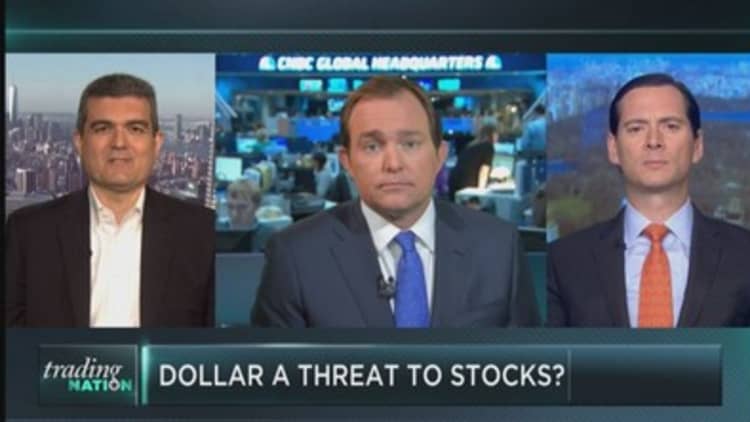
All of the sudden, the market appears to be finding a formidable foe in the U.S. dollar.
Companies as varied as Hewlett-Packard, Discovery Communications, Home Depot, Fossil, Goodyear Tire and Wal-Mart have complained or warned of "currency headwinds" in their earnings calls over the last month alone.
Oracle can now be added to that list. In its Tuesday evening call, co-CEO Safra Catz remarked on "unusually high volatility in exchange rates," and stated that "currency headwinds" were a 6 percent drag on revenue growth.
And unlike many events that companies call extraordinary when they need to assign blame for unattractive numbers, the dollar rally has truly been something to behold. Steven Englander, global head of G-10 FX strategy with CitiFX, found that this has been the dollar's biggest rally in the last 40 years (and quite possibly the last 80) on a trade-weighted basis.
Read More Why the euro's next move may shock the Street
The scary thing is that the earnings and guidance impacts may just be getting started.
"The Street doesn't slash revenue or earnings numbers just because a currency is moving—even the dollar," noted Nicholas Colas of ConvergEx in a memo to clients. "There are clearly more cuts to come."
Analyst behavior may accentuate this late cutting, he added. "Analyst will shift their earnings estimates to later quarter to avoid cutting full-year numbers. That means we could be looking at revenue and earnings revisions lower for much of 2015."
The relationship between the dollar and stocks is not always adverse. In fact, a strengthening economy would tend to drive both the dollar and the market higher, which may be why the two have often risen together over time.
But for companies that sell products abroad, a rising dollar is generally bad news, as it means that every cent made somewhere else is now worth a bit less at home.
Conversely, those lucky companies that import more than they export are fans of a rising dollar.
In fact, currency strategist Boris Schlossberg of BK Asset Management says these contrary effects set up an interesting pairs trade.
The dollar rally helps manufacturing stocks, "because it's the inputs that are very cheap, since energy is a huge input. But if you're technology, where the main input is intellectual property [which is created by workers who are paid in U.S. dollars] and they are selling it to Europe, they're going to get hurt," Schlossberg said. "It may be an interesting sector play here, where you get short tech/long manufacturing on this particular theme."
Still, on the whole, Schlossberg said the "easiest trade in the world is actually to be in European stocks."
Just as U.S. markets surged as the Federal Reserve eased, European stocks should be the big beneficiary of the European Central Bank's new quantitative easing program, he said. Of course, the fact that the ECB is easing just as the Fed is getting set to normalize policy is a big reason that the dollar has surged so impressively.
While noting that a given country's stock market and currency are often spotted partying together, technician Richard Ross of Evercore ISI agrees with Schlossberg's take.
"I think you want to be a buyer of stocks broadly speaking," Ross said. "But you want to be a better buyer of Europe and Japan over the U.S."
In other words, the dollar rise may not lead to extremely adverse effects for U.S. stocks on the whole. But perhaps it is an indication that the best opportunities are now found elsewhere.






